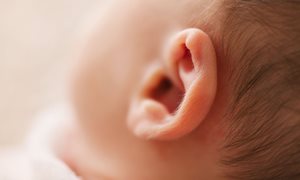
Family study
Hearing loss, which affects about one and a half million people in the Netherlands, can have many different causes, including exposure to loud noise, infection or aging. But it can also be caused by a genetic defect, which means that the hearing loss may not appear until later in life. Researchers at Radboud university medical center, led by Hannie Kremer and Ronald Pennings, theme sensory disorders, tracked down the gene by examining the genetic material (DNA) of entire families, including those with no symptoms. Almost all the family members were also given hearing tests.Some of these people had been waiting 20 years for an explanation for their hearing loss, and they now have it: a variant of the RIPOR2 gene appears to be responsible for the condition, known as DFNA21. The abnormal gene may cause the cilia (hair cells) to be less firmly embedded in the cochlea, eventually making them less effective at transmitting sound. The study also showed that this form of hearing loss starts around the age of thirty, with some degree of spread between the ages of twenty and fifty. The extent of hearing loss can also vary greatly, even within families.
More carriers
When the researchers examined a database of almost 23,000 other Dutch people who had been genetically tested, they found that 18 of them also carry this variant of the RIPOR2 gene. They therefore anticipate that about 13,000 Dutch people in total are carriers of the defective gene. Because the hearing damage only appears later in life, they estimate that approximately 9,000 of these people are currently experiencing hearing loss. This makes the abnormal RIPOR2 gene one of the most common hereditary causes of hearing loss in the Netherlands.A potential treatment is still a long way off, but the Nijmegen researchers have started conducting initial experiments. The affected families are also not sitting idly by and have set up a patients’ association, Stichting DFNA21 Nederland.
Related news items

Joint research in regional hospitals New research projects from promotion fund
22 November 2022Four research projects have been honored in the promotion fund of the Radboudumc and four regional hospitals. The research projects, which are a collaboration between CWZ, Jeroen Bosch Hospital, Rijnstate, Sint Maartenskliniek and the Radboudumc will receive a contribution of 240,000 euros.
go to page
L’Oréal-Unesco For Women in Science grants now open to researchers in Life Sciences and STEM disciplines
8 November 2022The eleventh call for applications of the Dutch L’Oréal-Unesco For Women in Science fellowships opens on 16 January 2023. But this year, it’s a little different: next to researchers in Life Sciences, women working in the STEM disciplines can also apply.
go to page
Take a special look inside Radboudumc on 2 October Open Day for young and old
12 September 2022On Saturday 1 and Sunday 2 October, the Radboud university medical center, Radboud University and the HAN are participating in the 'Weekend van de Wetenschap'. At all locations there are fun and interesting programs for young and old.
go to page
Course on entrepreneurship for PhD candidates and postdocs
19 July 2022Are you thinking about what to do after your PhD? Want to know more about entrepreneurship? This course gives you insight in many aspects of entrepreneurship and research in industry.
go to page
